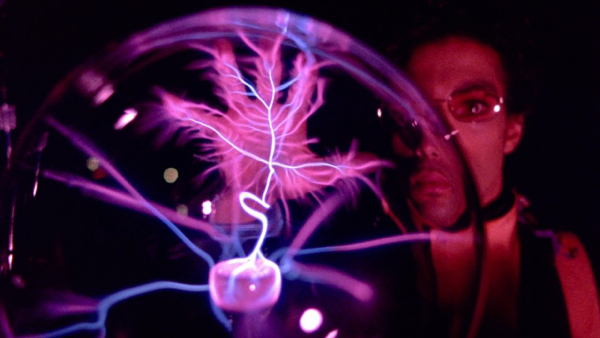
Movie reflection by Greg Carlson
The third theatrically released feature starring Prince, as well as his second directorial effort, “Sign o’ the Times” remains a concert film par excellence. The movie’s curious production history has been marked by stories that the vast majority of the visual content was captured at Paisley Park when footage from shows in Rotterdam and Antwerp didn’t pass muster. Message boards on Prince fansites turn up spirited discussions addressing the movie’s questionable status as a “live” artifact versus a lip-synched and overdubbed facsimile of a gig, but the theatrical presentation of the songs, linked as they are by a series of thin thematic sketches and the inclusion of David Hogan’s clip for “U Got the Look,” enhance rather than detract from the fantasia.
Showing on 234 screens in late November of 1987 following an October premiere in Detroit, “Sign o’ the Times” failed to gain much box office traction. Unsurprisingly, its second life on cable and home video cemented its status, even though the film has never been reissued on DVD or Blu-ray in America. With uncredited directorial assistance from “Purple Rain” helmer Albert Magnoli and outstanding production design by Leroy Bennett, the movie has become a go-to document of Prince’s fault line-rupturing command of stage, instruments, and fellow musicians – praise be to Sheila E.’s work and Prince’s “pretty good for a girl” wink.
Since its debut, Prince followers have obsessed over the film’s set list, comparing the movie to the album and lamenting the omission of “The Ballad of Dorothy Parker,” “Starfish and Coffee,” “Strange Relationship,” and “Adore,” the only four songs from the double LP that did not appear in one form or another in the film. And while a truncated “Little Red Corvette” segues into “Housequake,” the limitations of the movie’s 85 minute running time meant axing at least a half dozen earlier songs – including several from “Purple Rain” and “Parade” – that had been played on the “Sign o’ the Times” tour. Rumors suggest that film had been shot and edited for those tracks, but arguably, the movie works even better in its streamlined incarnation.
In his recent retrospective on the film, Nathan Rabin highlights the amazing “If I Was Your Girlfriend,” recognizing that Prince “contemplates an emotional intimacy that exists only between women and ponders whether this intimacy might be more powerful than sexual intimacy.” That incisive description alludes to what Rabin will go on to describe as Prince’s masterful range of soul-baring emotion, a characteristic of “Sign o’ the Times” that makes it the equal of “Purple Rain” and allows fans to select any number of songs as the movie’s pinnacle. With no disrespect to the Mariana Trench-deep groove of “Forever in My Life,” I remember choking up to “I Could Never Take the Place of Your Man” the first time I saw the movie, marveling at the differences between the screen performance and the album version.
Following the artist’s well-established pattern, “Sign o’ the Times” continues to showcase the fascinating truce between Prince’s libidinous and eroticized sex machine ethos (bear witness to his ongoing choreographed interplay with dancer Cat Glover!) and his increasingly present spiritual and social concerns. The title song and “The Cross” are the first and last numbers, representing that seriousness of purpose but also sandwiching the funk and sweat and flesh like cookie halves hugging a Double Stuf dollop of sweet creme.
In his monograph on “Sign o’ the Times,” Michaelangelo Matos identifies “Sign” and “Cross” as twins through the kinship of their desolate imagery and their glimmers of hope. Matos and the movie have the sequencing right: open with “Sign,” and instead of record closers “It’s Gonna Be a Beautiful Night” and “Adore,” finish with “The Cross” and its “ethereal harmonies that pop up near the end to sound like angels rising out of the concrete.”